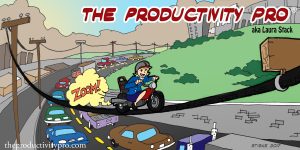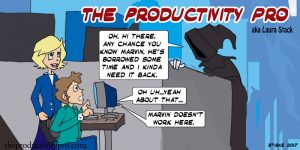
"Information technology and business are becoming inextricably interwoven. I don't think anybody can talk meaningfully about one without the talking about the other." —Bill Gates, American businessman and philanthropist, founder of Microsoft. What would life be like if the electronics revolution of the past 30 years hadn't happened? Among other things, my mission of teaching you how to achieve “Maximum Results in Minimum Time®” might have drowned in a sea of carbon paper, adding machine tape, fax print-outs, and conference calls. If you don't have a clue what those first few things are, then you can thank thousands of creative techies for that, and count your Millennial blessings! Productivity has skyrocketed in recent years due to technological progress, and there are plenty of ways … [Read more...]











